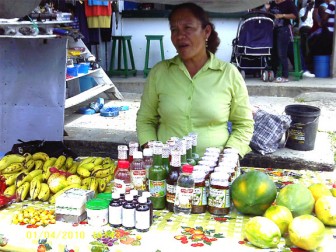The 11-year-old Pomeroon Women’s Agro Processors Association (PWAPA) has, over the years, come to be regarded as one of the region’s high-profile blue ribbon projects.
Vilma Da Silva, the association’s coordinator, makes no secret of the fact that the association values itself and its work highly. “I know that our prices are a bit steep, but we are producing quality products and our sustainability has earned us first place position at last year’s regional rural enterprise and innovation competition held in Barbados in July.”
One of the best-known agro processors in the region, the association has become widely known for its mango achar, pepper sauces, food seasonings, coconut oil and carambola fruit mix. All of these products benefit from the Pomeroon tradition for fruit production.

PWAPA was a response to what, up to that time, was a significant level of spoilage of fruit grown in the Pomeroon for which there was no ready market. More than that, the project sought to provide a modest solution to the problem of high unemployment among women in the area.
The present location of the association’s operations is at Charity, where a Carambola factory once operated. Subsequently, an approach was made to Go-Invest to secure advice on how to establish an agro-processing enterprise. In the process the association also secured technical support from the Inter American Institute for Cooperation in Agriculture (IICA.) Over the years the association has also benefited from support in the form of training as well as with the marketing of its products from Ministry of Agriculture, the Canadian International Development Agency (CIDA) and the Institute of Private Enterprise Development (IPED).
Virgin, the brand name under which the association’s coconut oil is marketed, grew out of discussions with a United States-based businesswoman, who had travelled to Guyana to purchase coconut oil for the cosmetics industry. Those discussions led to the introduction of the brand at GuyExpo last year.
Locally, Virgin coconut oil is in demand in both the cosmetics and health industries.
PWAPA’s green seasoning was first created to satisfy the demand by chefs in the mining industry. Having responded to the market, the association has expanded production in response to increased demand.
Its widely popular carambola fruit mix has, to a large extent, become a replacement for the more expensive imported fruit. Christmas, the customary black cake season, usually sees a significant increase in the demand for the carambola fruit mix.
The acquisition of seasonal fruit like pepper and mangoes often poses a challenge for the association and at the beginning of each season it signs agreements for the supply of pepper with two farmers in the area.
Apart from having grown in stature in the Pomeroon river and on the Essequibo river in recent years, PWAPA has also caught the attention of the Caribbean, securing an award in a region-wide competition for rural agricultural and agro processing projects considered worthy of emulation at the local and regional levels. The Rural Enterprise and Innovation Project,, staged by the Caribbean Regional Unit for Technical Assistance (CARUTA), is a regional competition aimed at recognizing projects that promote rural enterprise and innovation at the grass root .
The competition also seeks to identify potential in such projects for emulation at the local and regional levels. It was open to rural groups and associations in the ten Caribbean countries covered by CARUTA.
With further growth in mind, the association utilized the US$5,000 prize secured from the Rural Enterprise and Innovation Project to purchase additional equipment for its operations. It is now part of a Women’s Agro Processing Development network that includes two entities in Waini in Region One that produce coconut oil, another at Hosororo that produces cassava bread and other groups in hinterland regions.
Initially, members of the association contributed $20,000 each to its overall working capital while donor agencies also provided financial support. The start-up phase of the project attracted more than $20 million in funding from the various donor organisations. The funding was used primarily for the rehabilitation of the building, the creation of a reservoir, the installation of a water supply system, and the purchase of milling equipment.
While the association has never been known to make a huge profit, the coordinator says that it has grown significantly over the years. It employs four persons on a full-time basis. At the end of each year members of the association receive dividends and the surplus is ploughed back into the operation.
Production is undertaken by members of the organisation who are also in charge of marketing the products. Rosamund Benn, a former coordinator of the association, who currently serves as its vice chairperson, is responsible for marketing at the Charity Monday Market.
Markets for the agro products manufactured by the association are in Regions One and Three as well as popular supermarkets in the city.
In order to reduce its operational costs the association relies on trucks travelling to Georgetown to transport its produce.




